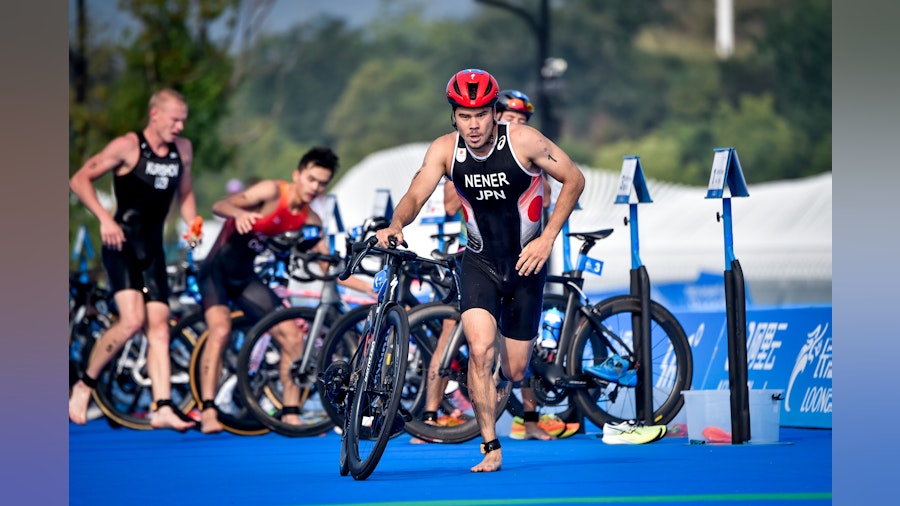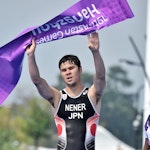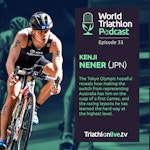World Triathlon Paths to Paris: Kenji Nener

The beauty of sport is seldom found in a gold medal or in crossing the line first. Inasmuch as sport can build character, it can also reveal it. It can show who we truly are as people and offer a chance to be fearless when everything is on the line.
In the latest chapter of World Triathlon’s Paths to Paris series, Kenji Nener (JPN) shares his take on the Olympic Games and what it means to rise to the occasion.
“The Olympics is basically an expression of who you are as an athlete.”
Some may focus on the scale of the event or what the moment itself means for an athlete’s career. For Kenji Nener, though, there is something far more personal and reflective to the Games.
Having made his first Olympic appearance in Tokyo, he is looking ahead to making a second in Paris.
Nener has not yet qualified for the Japanese team. To take the first priority selection, he needs to maintain a slot in the top-20 of the Olympic Qualification rankings. For most of the qualifying period, Nener has hovered within that elite group.
The place could still be could be threatened if he slips down the rankings or if two other Japanese men hit a top-8 finish at WTCS Yokohama. Otherwise, he is not far from being able to look ahead to Paris.
Already, Nener has thrown himself into training for the new season.
“It’s been a lot of travel. I haven’t even started the year yet and I’ve flown a lot.”
After his off-season break, he headed to Tenerife with Kristian Blummenfelt and Gustav Iden - “that was a shock to the system to be honest!” – and a training camp in Morocco followed before he journeyed back to Australia to visit family.
“Morocco killed me actually. It was 2600m above sea level and that definitely was a punch. I was cooked for about a month.”
Another camp in Sierra Nevada came next, although, going forward, Nener will be based in Japan. Aside from race weekends, he is looking forward to being in a fixed place for a spell.
The WTCS stops in Abu Dhabi and Yokohama formed the crux of his early season plan. In between, there is the first ever Hong Kong World Cup. Not often one to dip into the World Cup circuit, Nener’s decision to race there catches the eye.
“I’m using it as a chance to experiment with some race strategies. It’s more about simulation.”

With a view to Paris this summer, Nener’s Olympic preparation is therefore tactical as much as it is physical.
“By far my priority is definitely just to hit it until Yokohama and then after that I’m really just going to focus on the preparation for Paris. It doesn’t need to be an excessive amount of training, it just needs to be finding those 1% details and getting all those small things right.”
“I have over-trained a lot over the last couple of years. This is the first year I actually get to taper properly so we’ll see what happens!”
Although sickness went some way to explaining the circumstances, Nener was not happy with how he finished his 2023 campaign.
“The second half of last year was what I consider to be the poorer half in terms of results. I was in far better training condition than I was in the first half of the year so it was really quite frustrating. I was unable to demonstrate close to my potential at all.”
In the first half of the season, Nener finished 11th in Yokohama, 9th in Cagliari and 10th in Montreal. Interspersed with those results was a good finish at the French Grand Prix race in Metz.
“I still didn’t dictate the race,” countered Nener. “On the run, the race was not determined by me at all. I need to learn how to actually race.”
Hence, he will be heading to Hong Kong in search of practice. His rivals like Dorian Coninx, Hayden Wilde, Leo Bergere and Alex Yee have raced at the front of WTCS fields on numerous occasions.
“I haven’t actually been there,” said Nener. “I’ve been what I consider to be one standard deviation back.”
When it comes to discussing Nener’s performances, the concept of self-expression returns.
“I haven’t been able to express my abilities. I know, physically, I should be there, I just haven’t been able to demonstrate it. It’s easy for me to say that but I’m confident that I should be there if I deliver on the day.”
“When I was training with Alex (Yee) in Loughborough last year, I was in arguably the best shape, run-wise, of my life. I couldn’t demonstrate it; I was running so badly off the bike in races.”
“That’s just the nature of the sport. Sometimes it doesn’t translate.”

When it comes to the Olympic Games, some of his sharpest insights were reserved for the course.
“I’m a bit 50-50, to be honest,” acknowledged Nener. “I think it’s an extremely fast course. I think it could be good if people want to challenge themselves on the bike, but if people are going to idle then it’s going to be a very stagnant race.”
“I think you can ride that course so quick that it’ll be hard for the pack behind to close the gap if you’re smart. The velocity you can ride at around that course can be so quick if you potentially do the right line and rotations that I don’t think it will close. There aren’t enough cobbles for it to be a ‘grunt’ course either, so for someone who has a lot of power to jump across the cobble sections.
Looking back to the Olympic Test Event, in both the men’s and women’s races the field broke up in the swim only to come back together on the bike. As a result, the velocities Nener anticipates this summer were not really on show. One line of thought could be that the athletes were reticent to show their cards.
Nener pointed to another factor.
“What I will say is they were more concerned with qualification. I think some athletes were definitely concerned with that and didn’t express their abilities in the swim-bike part, they just wanted to give themselves the best chance to make the team.”
“The Olympics is different. I’m pretty sure they will want to express themselves as an athlete.”
Thus, Nener is expecting a fast, aggressive race in Paris. At the same time, there will have to be a balance between the quest for self-expression and cold, hard results. In an ideal world both would go hand-in-hand.
Sometimes risks don’t pay off but sometimes they do.
“What I think will happen on the day in Paris is that there will be fifteen people on the start line that could medal. It’s not going to go the way of eight. It could happen for seven and four of them will make a mistake. Bronze will not be quite as good as the guys that get first and second so, really, you can say the bronze medal is up for grabs.”
“I believe if things go my way, I could medal.”
Olympic history supports him. In Tokyo, Hayden Wilde claimed Olympic bronze without a WTCS medal to his name. Moreover, Henri Schoeman won Olympic bronze in Rio de Janeiro before taking a first WTCS medal.
If history suggests a medal is possible, Nener believes a real taper could help. “I don’t think I’ve been ever fresh enough to perform at 100%,” he summises.
When it comes to Paris, there is also a simple fact that may also liberate how he races.
“It’s my last Games,” he confirmed. “I don’t know how many people will go into that race, apart from maybe Kristian (Blummenfelt), or Vincent (Luis) or maybe Pierre (Le Corre), with that mentality. There will be very few people that so strongly believe that this is it. It’s not like I feel the impending pressure, but if you’re going to demonstrate something, you’ve got to do it now.”
When all is said and done, then, this summer might be the chance to see the true Kenji Nener when he lays it all on the line.
Related articles
-
Kenji Nener crowned Asian Games champion in Hangzhou
12:49 - 29 Sep, 2023 -
World Triathlon Podcast 33: Kenji Nener
07:50 - 07 Apr, 2021









